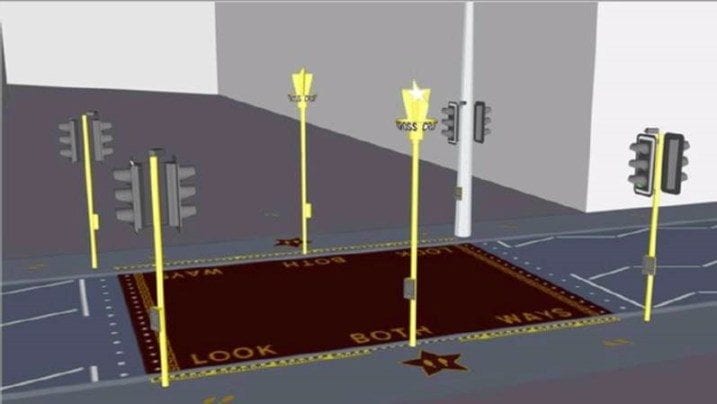The UK cities of Liverpool and Hull will trial new pedestrian crossings, informed by behavioural insights, to cut road accidents and deaths.
This includes an advanced crossing that uses audio-visual prompts – called ‘embedded nudges’ – and a faster-boarding system that reduces wait times for pedestrians by giving them priority over cars.
Liverpool reportedly has the highest rate of adult deaths or serious injuries (KSIs) for pedestrian collisions in the UK outside of London, at 99 per 100,000 people.
As part of a wider strategy to bring this number down, Liverpool City Council is working with So-Mo, a local behavioural science company that has designed the new crossings following a study into pedestrian behaviour.

The research highlighted a high rate of evening collisions in the city centre. It also pinpointed an issue with accidents on busy arterial routes.
So-Mo’s crossings will be installed at a central accident hotspot on Hanover Street/Bold Street and on a yet-to-be-confirmed high street on the outskirts of the city.
The trials, which are due to get underway in early 2021, will help determine whether the interventions make pedestrians cross more safely.
Metrics over two years will include measuring the increase in the number of crossings made inside the designated area and the increase in pedestrians using the crossing correctly.
Exactly how these behaviours will be observed is not being disclosed.
A spokesperson for Liverpool City Council said: “This project will rely on people acting naturally in a particular situation.
“If the nature of the crossings is to be disclosed in full prior to the commencement of the trials, then we cannot guarantee true reactions or usage of the crossings.”
To test replicability, the trial will also be repeated in Hull, where pedestrians represent 14% of all road casualties and 26% of those killed and seriously injured.
Hull was chosen as it has a comparable road network and socio-demographic profile to Liverpool.
Ruth Stephenson, head of highways, transport, strategy and design, Hull City Council, said: “If we want to reduce casualties then we need to consider doing something different.
“This is a trial to understand how we can influence pedestrian behaviour. If the trial is successful, we would want to consider if it is something we could introduce on a permanent basis.”
The pilot is funded by a £196,000 grant from the Road Safety Trust, with the support of the Department for Transport and the Merseyside Road Safety Partnership.
So-Mo was selected by Liverpool City Council through a tender procurement process.
The two organisations have previously worked together on Liverpool’s 20 Effect initiative to bring 20mph zones to the city’s streets.
A recent review found that the speed limit, which is mandatory on some roads and advised on others, has helped cut collisions by an average of 191 per year.
Read more from CiTTi
https://www.cittimagazine.co.uk/road-safety-foundation-funding-to-help-vulnerable-road-users/
https://www.cittimagazine.co.uk/automated-pedestrian-crossings-to-be-rolled-out-in-greater-sydney-health-precincts/
https://www.cittimagazine.co.uk/study-supports-plan-for-20000-crossings-in-greater-manchester/
https://www.cittimagazine.co.uk/ai-technology-to-improve-road-safety/
https://www.cittimagazine.co.uk/pedestrian-motion-prediction-algorithms-enhance-automated-vehicle-safety-features/





